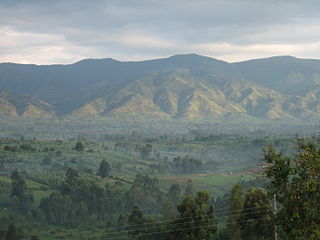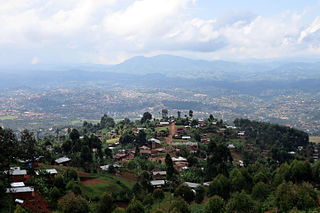Related Research Articles

Politics of the Democratic Republic of Congo take place in the framework of a republic in transition from a civil war to a semi-presidential republic.
The Armed Forces of the Democratic Republic of the Congo is the state organisation responsible for defending the Democratic Republic of the Congo. The FARDC was rebuilt patchily as part of the peace process which followed the end of the Second Congo War in July 2003.

The Democratic Republic of the Congo, also known as Congo-Kinshasa is a country in Central Africa. By land area, the Congo is the second-largest country in Africa and the 11th-largest in the world. With a population of around 109 million, the Democratic Republic of the Congo is the most populous Francophone country in the world. The national capital and largest city is Kinshasa, which is also the economic center. The country is bordered by the Republic of the Congo, Central African Republic, South Sudan, Uganda, Rwanda, Burundi, Tanzania, Zambia, Angola, the Cabinda exclave of Angola, and the South Atlantic Ocean.

North Kivu is a province bordering Lake Kivu in the eastern Democratic Republic of the Congo. Its capital is Goma. The 2020 population was estimated to be 8,147,400.

The Second DR Congo War, also known as Africa's World War, the Great War of Africa, or the Great African War, began in the Democratic Republic of the Congo on 2 August 1998, just over a year after the First Congo War, and involved some of the same issues. It began when Congolese president Laurent-Désiré Kabila turned against his Rwandan and Ugandan allies who had helped him come to power.

The United Nations Organization Stabilization Mission in the Democratic Republic of the Congo or MONUSCO, an acronym based on its French name Mission de l'Organisation des Nations Unies pour la stabilisation en République démocratique du Congo, is a United Nations peacekeeping force in the Democratic Republic of the Congo (DRC) which was established by the United Nations Security Council in resolutions 1279 (1999) and 1291 (2000) to monitor the peace process of the Second Congo War, though much of its focus subsequently turned to the Ituri conflict, the Kivu conflict and the Dongo conflict. The mission was known as the United Nations Mission in the Democratic Republic of Congo or MONUC, an acronym of its French name Mission de l'Organisation des Nations Unies en République démocratique du Congo, until 2010.

The term Mai-Mai or Mayi-Mayi refers to any kind of community-based militia group active in the Democratic Republic of the Congo (DRC) that is formed to defend local communities and territory against other armed groups. Most were formed to resist the invasion of Rwandan forces and Rwanda. Groups that fall under the umbrella term "Mai-Mai" include armed forces led by warlords, traditional tribal elders, village heads and politically motivated resistance fighters. Because Mai Mai have only the most tenuous internal cohesion, different Mai-Mai groups allied themselves with a variety of domestic and foreign government and guerrilla groups at different times. The term Mai-Mai refers not to any particular movement, affiliation or political objective but to a broad variety of groups.

Goma is the capital and largest city of the North Kivu Province in the eastern region of the Democratic Republic of the Congo (DRC). It is located on the northern shore of Lake Kivu, next to the Rwandan city of Gisenyi. It shares its borders with Bukumu Chiefdom to the north, Rwanda to the east, Masisi Territory to the west, and is flanked by Lake Kivu to the south. The city lies in the Albertine Rift, the western branch of the East African Rift System, and is only 13–18 km (8.1–11.2 mi) south of the active Nyiragongo Volcano. With an approximate area of 75.72 square kilometers, the city has an estimated population of nearly 2 million people according to the 2022 census, while the 1984 estimate placed the number at 80,000.

Butembo is a city in North Kivu, in the north eastern Democratic Republic of Congo, on the Rwenzori graben and west of Virunga National Park. The city is an important commercial centre with large markets, a cathedral, multiple large hospitals, and an airport. It is the city where live the most prosperous businessmen of the East of the country. The city is located in a region known for tea and coffee growing. As of 2024 it had an estimated population of 154,621.

The Transitional Government of the Democratic Republic of Congo was tasked with moving from the state riven by the Second Congo War (1998–2003) to a government based upon a constitution agreed on by consensus. In 2001, President Laurent Kabila was assassinated, and his son Joseph Kabila was named head of state.

Azarias Ruberwa Manywa is a Congolese politician, lawyer, and public figure. During the Second Congo War he was Secretary-General of the Rassemblement Congolais pour la Démocratie (RCD-G) rebel group. Following the war, he was one of the vice-presidents in the transitional government of the Democratic Republic of the Congo between 2003-2006. He has also been the leader and president of RCD-G's political party since 2003. He is a member of the Banyamulenge community of South Kivu who belong to the Tutsi ethnic group.

The mining industry of the Democratic Republic of the Congo produces copper, diamonds, tantalum, tin, gold, and more than 70% of global cobalt production. Minerals and petroleum are central to the DRC's economy, making up more than 95% of the value of its exports.
Congolese history in the 2000s has primarily revolved around the Second Congo War (1998–2003) and the empowerment of a transitional government.

The Kivu conflict is an umbrella term for a series of protracted armed conflicts in the North Kivu and South Kivu provinces in the eastern Democratic Republic of the Congo which have occurred since the end of the Second Congo War. Including neighboring Ituri province, there are more than 120 different armed groups active in the eastern Democratic Republic of Congo. Currently, some of the most active rebel groups include the Allied Democratic Forces, the Cooperative for the Development of the Congo, the March 23 Movement, and many local Mai Mai militias. In addition to rebel groups and the governmental FARDC troops, a number of national and international organizations have intervened militarily in the conflict, including the United Nations force known as MONUSCO, and an East African Community regional force.

The National Congress for the Defence of the People is a political armed militia established by Laurent Nkunda in the Kivu region of the Democratic Republic of the Congo in December 2006. The CNDP was engaged in the Kivu conflict, an armed conflict against the military of the Democratic Republic of the Congo. In January 2009, the CNDP split and Nkunda was arrested by the Rwanda government. The remaining CNDP splinter faction, led by Bosco Ntaganda, was planned to be integrated into the national army.

Alexis Thambwe Mwamba is a Congolese politician who has assumed various political roles and offices since the early 1980s going from Minister of Public Works, Minister of State Portfolio, Minister of Transportation, Minister of Planning, Minister of Foreign Affairs and recently in December 2014, he was appointed Minister of Justice of the Democratic Republic of the Congo.
The Congolese Rally for Democracy, also known as the Rally for Congolese Democracy, is a political party and a former rebel group that operated in the eastern region of the Democratic Republic of the Congo (DRC). It was supported by the government of Rwanda, and was a major armed faction in the Second Congo War (1998-2003). It became a social liberal political party in 2003.
The Congolese Rally for Democracy–Goma was a faction of the Congolese Rally for Democracy, a rebel movement based in Goma, Democratic Republic of the Congo (DRC) during the Second Congo War (1998–2003). After the war, some members of the group continued sporadic fighting in North Kivu. The movement also entered mainstream politics, participating in democratic elections with little success.
Société Aurifère du Kivu et du Maniema, SARL (SAKIMA) is a Congolese state-owned mining company which holds interests in various gold and tin mines in the provinces of Maniema, North Kivu and South Kivu in the eastern Democratic Republic of the Congo. The company's operations are based in the town of Kalima.

The Lueshe mine, or Lweshe mine, is a niobium mine located in Rutshuru Territory in North Kivu province of the Democratic Republic of the Congo. The site is one of the most economically significant pyrochlore deposits in the world. The rare niobium mineral lueshite was discovered at the mine, and is named after it. The mine is frequently caught up in violence surrounding the Kivu conflict.
References
- 1 2 "Maniema: Gertrude Kitembo élue présidente de l'Assemblée provinciale". Archived from the original on 23 March 2019. Retrieved 4 March 2021.
{{cite web}}: CS1 maint: bot: original URL status unknown (link) - 1 2 David Pallister (4 December 2003). "UN names forces in struggle for Congo gold fields". The Guardian. Retrieved 4 March 2021.
- ↑ Ali B. Ali-Dinar (20 August 1998). "DRC: WHO'S WHO - KEY MEMBERS OF THE REBELLION 1998.8.20". Penn University. Retrieved 4 March 2021.
- ↑ "Les anciens gouverneurs". Archived from the original on 18 December 2019. Retrieved 4 March 2021.
- ↑ "Transitional government". The New Humanitarian. 3 July 2003. Retrieved 4 March 2021.